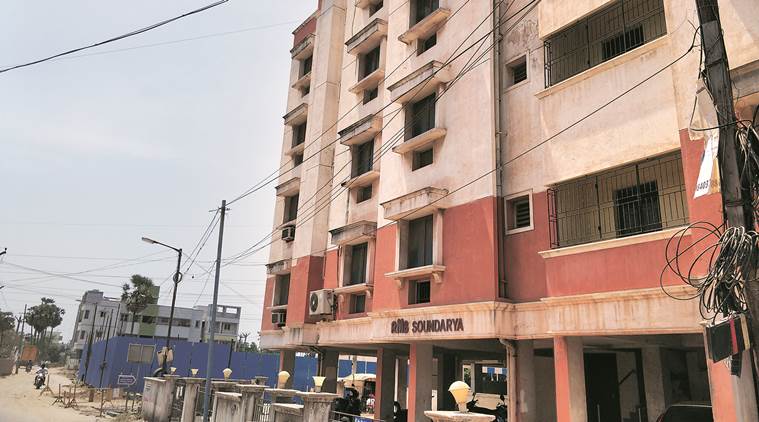 The office of Netsweeper Technologies India Pvt Ltd is located in this building in Chennai. (Express Photo/Arun Janardhanan)
The office of Netsweeper Technologies India Pvt Ltd is located in this building in Chennai. (Express Photo/Arun Janardhanan)
Netsweeper claims to be the first Internet content-filtering company to develop and use a form of hybrid Artificial Intelligence technology to scan “over 10 billion URLs till date”, assign content to categories and update its filter system without human intervention in real-time to serve “over 500 million end users”.
Registered in Canada’s Ontario in 1999, Netsweeper is now a global giant with offices in the UK, UAE, India and the Netherlands, and distributors servicing the US, Central Asia and South America. In 2014, it moved a part of its operations to Barbados, registering two new firms including NetSweeper Holdings Inc, CBC reported.
Records show that Netsweeper Technologies Pvt Ltd was incorporated in Chennai in 2005 — state-owned BSNL was one of its early clients. In 2017, a new entity, Netsweeper Technologies India Pvt Ltd, was set up “to integrate India operations more closely with the headquarters”, a company official said.
The Indian Express visited two address listed in Registrar of Companies (RoC) records of Netsweeper Technologies Pvt Ltd in Chennai. One of them, an apartment on the twelfth floor of Arihant Majestic Towers in Koyambedu, was locked. Neighbours and security staff said the office was shifted to the first floor last year before the firm vacated the building about six months ago.
The other led The Indian Express to a three-room flat in Soundarya Apartments, a residential complex in Mel Ayanambakkam, a dusty industrial area in the suburbs. There was no signboard of the company outside the flat on the fourth floor of the building. There were two women inside, who identified themselves separately as a cleaner and a temporary staff. Both confirmed that Netsweeper was “one of the offices” that functioned from here.
The two directed all queries to “Prabhu Kannan, the owner”. When contacted, Kannan said he was the Chartered Accountant of the newly formed Netsweeper Technologies India Pvt Ltd. “They share my office facility, from where I run two of my other firms. This firm was incorporated recently and has just started services. It has two directors and is in the process of expansion right now,” he said. Kannan said the new entity had “zero transactions” and “no clients so far”. “The address is a virtual centre as the company couldn’t afford an office space of its own,” he said.
Contacted over phone, Gajapathy Chakravarthy, one of the two directors of Netsweeper Technologies Pvt Ltd incorporated in 2005, said M J Tiwari headed firm’s India operations from New Delhi. Before joining the company in 2012, Tiwari was a Trade Commissioner at the Canada High Commission in New Delhi where he “assisted over 100 Canadian companies…connect with the who’s who of Indian IT and Telecom industry”. When contacted by The Indian Express, Tiwari directed all queries to Netsweeper’s headquarters in Canada.
In December 2013, Netsweeper-Canada was part of a trade mission to India as one of the 11 top Canadian companies.
What they look for, who does it, how
The Indian government can block websites under three circumstances: in compliance with court orders, if the designated 5-member Committee for Examination of Requests (CER) clears a blocking request, if the secretary of the Ministry of Electronics and Information Technology (MeitY) considers it necessary in an emergency. They look for content that can impact sovereignty and integrity, defence, security, ties with foreign states, public order, incitement to commit a cognizable offence.
All requests to block websites, except for direct orders from the judiciary, must be vetted by CER. The panel comprises a designated officer (group coordinator, cyber law), a joint secretary each from the Home and I&B ministries, an additional secretary from the Law Ministry and a senior director of the Indian Computer Emergency Response Team (CERT-In).
A review panel comprising the Cabinet secretary, secretary (legal affairs) and secretary (telecom) meet at least once in two months to validate that directions to block websites are in compliance with section 69A(1) of the IT Act.
ISPs that fail to comply “shall be punished with an imprisonment for a term which may extend to seven years and also be liable to fine”.
Rule 16 of IT Rules 2009 mandates strict confidentiality regarding all requests, complaints and action taken.